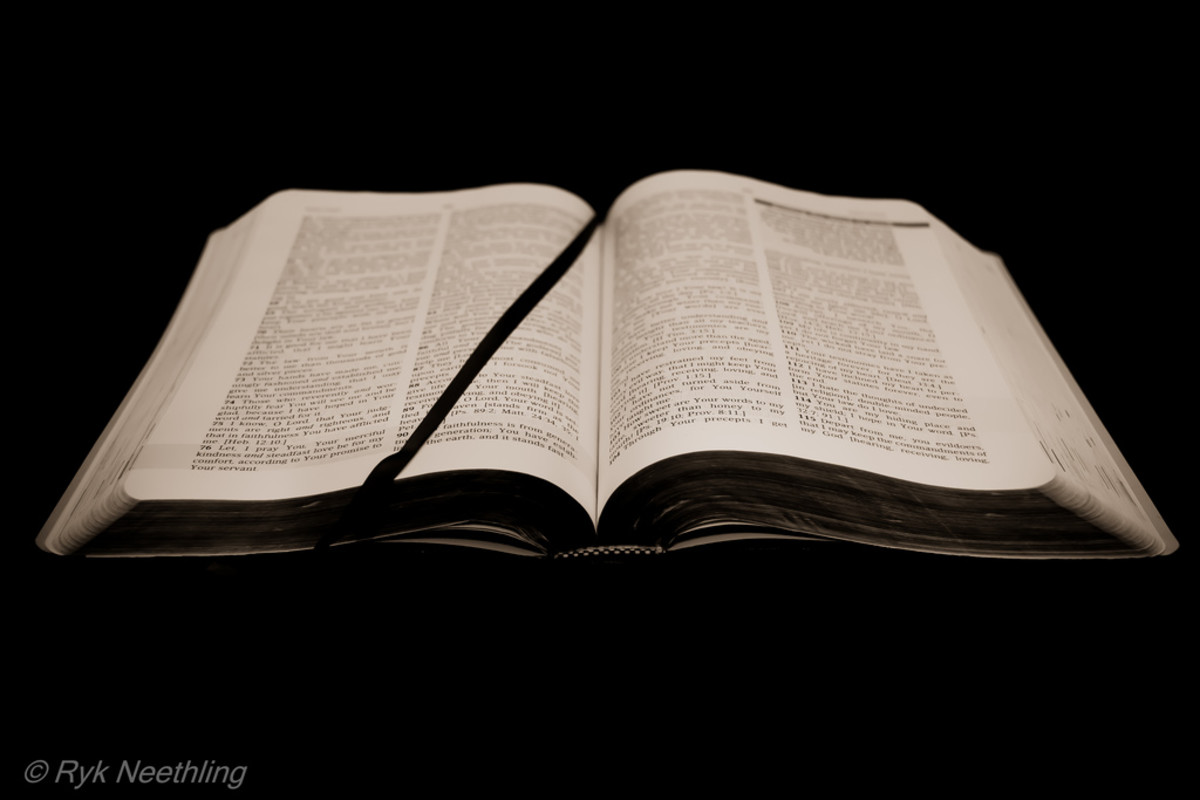Biblical Examples of Divorce, Episode VIII

Divorces in the Bible
The examples of divorce in the Bible will do much to enlighten the sincere Seeker of Truth on this particular topic. An example is a most powerful thing. Though one may be in the possession of a given command, it is not altogether clear just how the command was, or is, carried out, unless there is a recorded example of the execution of the command under question. In the case of divorce, the Bible is not at all silent. Holy Scripture records a divorce between Samson and his Philistine wife (Judges 14:1-15:6), and a divorce is indicated in 1 Samuel 18:12-17 between David and Saulʼs daughter Merab. Also there are the notable divorces between Abraham and Hagar, Herodias and Philip and Yahweh and Israel. We will focus our study on the last three notable biblical divorces: namely, Abrahamʼs divorce from Hagar (Genesis 21:8-14); Yahwehʼs divorce of Israel (Isaiah 50:1; Jeremiah 3:8); and Herodiasʼ divorce from Philip, and her remarriage to Herod Antipas.
Sarah gives Hagar to Abraham for a Wife

Abraham and Hagar
When one thinks of Abraham sending Hagar away, one is not likely to think in terms of a divorce. We usually think of Hagar as Abrahamʼs mistress—a concubine, at best. Therefore, her expulsion from the family unit has not been taken as seriously as it deserves.
This tragic story begins in Genesis chapter 16; where, at Saraiʼs behest, Abram (his name not yet changed to Abraham) receives the Egyptian woman Hagar as a second wife. Scripture is clear at this point about the relationship between Abram and Hagar—she was nothing less than a wife to him, and he was nothing less than a husband to her. Presented here is the clear witness of the Word of God:
“And Sarai, Abrams wife took Hagar her maid the Egyptian, after Abram had dwelt ten years in the land of Canaan, and gave her to her husband to be his wife” (Genesis 16:3).
Of course the reason for this plural marriage was so Abraham could have a seed to continue after him. See verse 2, “And Sarai said unto Abram, Behold now, the LORD hath restrained me from bearing: I pray thee, go in unto my maid; it may be that I may obtain children by her. And Abram hearkened to the voice of Sarai.”
From this marriage, Abramʼs first son was born; he was named Ishmael. When Ishmael was thirteen years old he entered covenant relationship with Yahweh through the rite of circumcision, along with his father (Genesis 17:24-26).
One can only imagine the closeness between Abraham (by this time Abram had become Abraham —Genesis 17:5) and Ishmael. We get a glimpse of this in Abrahamʼs plea to Yahweh in behalf of Ishmael, requesting that Ishmael be his heir. By this time in Abrahamʼs life his faith and hope for the future was placed solidly in Ishmael, who was his son by his Egyptian wife. Here is how the Bible reads:
“Then Abraham fell upon his face, and laughed, and said in his heart, Shall a child be born unto him that is an hundred years old? And shall Sarah, that is ninety years old, bear? And Abraham said into God, O that Ishmael might live before thee!” (Genesis 17:17-18).
We, no doubt, would be safe to assume a special fondness for Hagar, on Abraham’s part, for giving him such a promising son. However, God was about to open the womb of Sarah and she was to bear Isaac—the son of promise.
The peace of paradise was broken at the weaning of Isaac (Genesis 21:8-12). Hagarʼs son, Ishmael (fifteen or sixteen years old at this time), began to mock the child Isaac in the presence of his mother Sarah: “And Sarah saw the son of Hagar the Egyptian, which she had born unto Abraham, mocking” (Genesis 21:9).
Sensing the competition that would ensue between the two boys, Sarah demanded that Abraham: “... Cast out this bondwoman and her son: for the son of this bondwoman shall not be heir with my son, even with Isaac” (Genesis 21:10).
Sarahʼs demand distressed Abraham; for, after all, Hagar was his wife and Ishmael was his firstborn son. We can hear the tenor of the grief of both Abraham the husband, and Abraham the father, in verse 11, where the Bible says: “And the thing was very grievous in Abrahamʼs sight because of his son.”
As grievous as Sarahʼs demand was, Abrahamʼs real problem came when God took her part in the family politics: “And God said to Abraham, Let it not be grievous in thy sight because of the lad, and because of thy bondwoman; in all that Sarah hath said unto thee, hearken unto her voice; for in Isaac shall thy seed be called” (Genesis 21:12). ~ For Abraham, there was nothing left to do but put Hagar away, along with her son.
This earliest biblical example of divorce stands out in the pages of holy Scripture, because of the parties involved. The man was the Father of Faith, the patriarch of both natural and spiritual Israel; the woman Hagar became the Queen Mother of a mighty people (see Genesis 17:20).
Since Abraham and Hagarʼs divorce predates the law of Moses, the actual “Bill of Divorcement” (required by Moses), was not necessary. The Words of Institution, which required the “Bill of Divorcement,” found in the Deuteronomy 24:1-4, did not create the institution of divorce. As we have seen, divorce was practiced by Godʼs people before; the Law of Moses simply came along-side a recognized practice, to support and regulate it. Therefore, the lawʼs relationship to divorce is much the same as its relationship to the Sabbath and Tithing. All three (Sabbath observation, tithe paying, and divorce) were practiced from of old; the Law of Moses only undergirded them.
This understanding will move us a far piece down the road of right thinking, as we deal with the objection to divorce, which claims it to be a product of the Law of Moses. This objection denounces divorce as an ordinance of the Sinaitic Covenant which has no currency in the New Testament economy. This objection fails, however, in the light of Abrahamʼs divorce of Hagar. A divorce, by the way, that was supported by Yahweh, Himself: “And God said unto Abraham, Let it not be grievous in thy sight because of the lad, and because of thy bondwoman; in all that Sarah hath said unto the, hearken unto her voice; for in Isaac shall thy seed be called” (Genesis 21:12).
One final word on Abrahamʼs divorce from Hagar the Egyptian: The grounds for this divorce was not unfaithfulness, nor was it abandonment; the ground of this divorce was protection of the covenant promise. Sarahʼs words are clear on this matter: “... for the son of this bondwoman shall not be heir with my son, even with Isaac” (Genesis 21:10).
Before we yield to our impulse to be critical of Sarah, we must remember what she was remembering; namely, that Yahweh had said, “But my covenant will I establish with Isaac, which Sarah shall bear unto thee at this set time in the next year” (Genesis 17:21). ~ The bottom line is this: The Lord God supported Abrahamʼs divorce from Hagar on the grounds of Pre-emptive Covenant Protection.
Abraham Sends His Wife Hagar Away
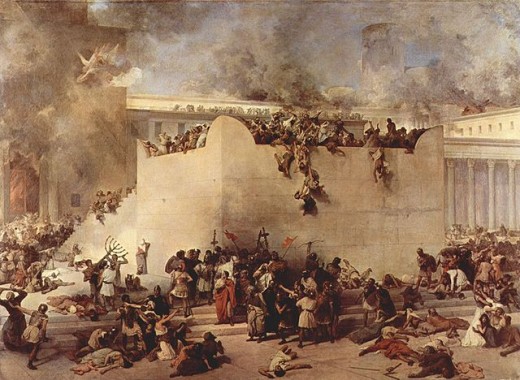
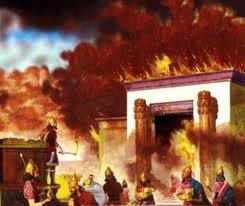
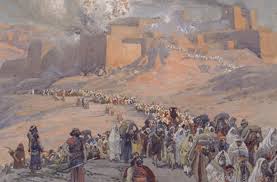
Yahweh Divorces Israel
We next move to a review of Yahwehʼs divorce from Israel. Two passages establish this as a fact: Isaiah 50:1 and Jeremiah 3:8.
- “Thus saith the LORD, Where is the bill of your motherʼs divorcement, whom I have put away? ... and for your transgressions is your mother put away” (Isaiah 50:1).
- And I saw, when for all the causes whereby backsliding Israel committed adultery I had put her away, and given her a bill of divorce; yet her treacherous sister Judah feared not, but went and played the harlot also” (Jeremiah 3:8).
In the two passages cited above Israel is metaphorically the wife of Yahweh who was divorced because of unfaithfulness. The Lord accused her of having “... played the harlot with many lovers” (Jeremiah 3:1). She had “... defiled the land, and committed adultery with stones and with stocks” (Jeremiah 3:9). ~ In the Theology of Marriage, Israel is viewed as Yahwehʼs covenant wife; therefore, any worship of false gods is fornication. Since fornication broke the marriage contract it was grounds for divorce.
The obvious truths revealed in these passages is the righteousness of divorce when executed for a righteous cause. While one may be taken aback by such a statement as “the righteousness of divorce,” one must admit that the Lord God, Yahweh Himself, participated in divorce with adulterous Israel. It is further recognized that there is no unrighteousness with God. In fact the Psalmist writes:
“The Lord is righteous in all his ways, and holy in all his works” (Psalms 145:17).
Therefore, for Yahweh (who “is righteous in all his ways”) to have actively divorced His wife, it must have been a righteous act, and a holy work.
There is a method used to present an argument called a syllogism, in which a conclusion is drawn from two propositions which form a major and a minor premise. The following syllogism works well here. Notice:
Proposition #1 (Major Premise)
Yahweh is righteous in all His ways, He is holy in all His works (Psalms 145:17).
Proposition #2: (Minor Premise)
Yahweh divorced Israel, giving her a bill of divorce (Isaiah 50:1 and Jeremiah 3:1-8).
Conclusion:
Yahwehʼs divorce of His wife (i.e. Israel) was a righteous and holy work.
Ultimately, the conclusion one comes to is that divorce is not intrinsically wrong. If Yahweh engaged in the act, it should not be unacceptable to His people. We may disclaim the misuse of divorce for selfish purposes, but one may not reject the biblical institution of divorce, out of hand. To do so is to ignore the clear teaching of Godʼs Word, and insult the righteousness of God.
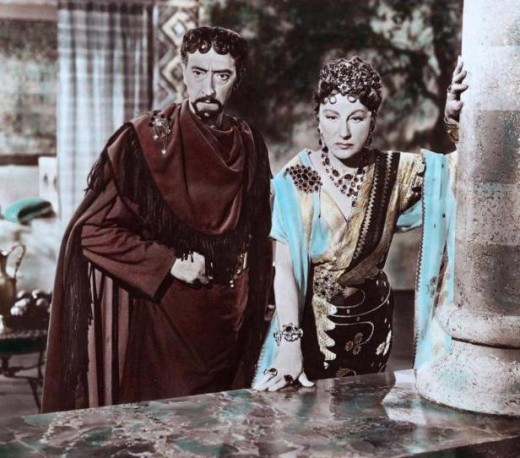
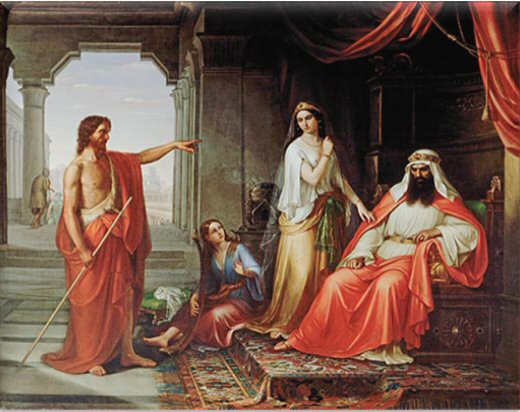
Herodiasʼ Divorce from Philip
We come, finally, to the love triangle between Herodias and her two uncles: Herods, Philip and Antipas. (See Matthew 14:3, 6; Luke 3:19.)
This narrative, related by both Matthew and Luke, is often referenced to denounce divorce for any reason whatsoever. It has even been used to teach that a divorce and remarriage, before oneʼs new birth into Christ, makes the new believer an adulterer or an adulteress. However, as usual, those who would argue such points assume too much, and argue too far in front of Scripture.
It would help us to understand a little about the players in this story. First, there is Herod Antipas, who ruled over Galilee and Perea (4 B.C.-A.D. 39), and Philip his brother; both were the sons of Herod the Great by different mothers: the mother of Antipas was Malthace, while the mother of Phillip was Mariamne, the daughter of Simon the high priest. Then there was the woman in this triangle: Herodias—who was the daughter of an another son of Herod the great. This family connection meant that Herodias was the niece to both her first and second husbands. Historical records relate that Philip lived in Rome, while his wife, Herodias, was a guest in the home of his brother Herod Antipas, in Tiberias on the Sea of Galilee. While his guest, Antipas persuaded Herodias to leave Philip and become his wife. It is, most likely, of some import that Mark does say that Antipas married her:
“For Herod himself had sent forth and laid hold upon John, and bound him in prison for Herodiasʼ sake, his brother Philipʼs wife: for he had married her” (Mark 6:17). ~ One may assume a divorce from Philip since Antipas and Herodias were married. Accentuating to this royal matrimonial mess is the prophet of God—who cries out against the sin of it all (Matthew 14:4//Mark 6:18//Luke 3:19).
As stated above, it is assumed that Herodias had divorced Philip, though the Bible does not say so directly. However, this is even more likely since the historical records relate that Antipas divorced the daughter of Aretas IV of Arabia (mentioned in 2 Corinthians 11:32), in order to marry Herodias, his own niece and the wife of his brother.
Notice, carefully, exactly, what Johnʼs indictment was: “... It is not lawful for thee to have her” (Matthew 14:4). And, “... It is not lawful for thee to have thy brotherʼs wife” (Mark 6:18).
The accusation of the Baptist was not against divorce, per se, but against the unlawfulness of their marriage. The problem was not that she had previously been married (for the Jewish Scripture gave a license to divorce - Deut 24:1-4). The problem was that she was Antipasʼ near kinswoman (on two counts):
1. She was his niece, and
2. She was his brotherʼs wife: his sister-in-law. The sin that John accused them of, and the grounds of rejecting their marriage, was incest.
The Law of Moses is clear concerning this particular sin: “None of you shall approach to any that is near of kin to him, to uncover their nakedness: I am the LORD ... thou shalt not uncover the nakedness of thy brotherʼs wife: it is thy brotherʼs nakedness.” (Leviticus 18:6, 16.)
In this case it was not the divorce but the marriage, that was unlawful. Notice, again, Johnʼs words: “... It is not lawful for thee to have thy brotherʼs wife” (Mark 16:18 cf Leviticus 18:16).
Therefore from the facts of the case, it is clear that those who use this narrative to teach against the institution of divorce and remarriage are missing the whole impact of Johnʼs message: namely, the marriage was unlawful because Herodias was the sister-in-law to Antipas, and his niece to boot! (See Leviticus 18:16.)
Apostolically Speaking
☩Jerry Hayes
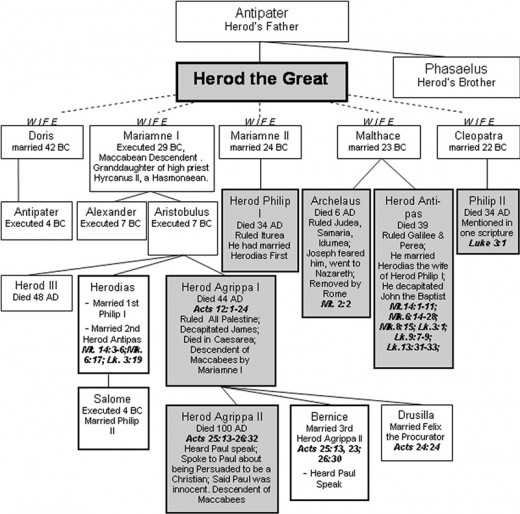
Bishop's Other Writings on the Topic
- Christian Divorce and Remarriage
This series of articles answers the all consuming question: May a Christian divorce and remarry? This is the first of many article to come on the subject. Be sure to read them all. - Christian Divorce and Remarriage, (Egalitarian)
This article concludes the introduction to Christian Divorce and Remarriage. Here is discussed the egalitarian aspect of Divorce. - Marriage, As God Intended (Episode III, Christian Divorce & Remarriage)
This article examines the intention of God for marriage, in the beginning. What the Bible declares marriage to be is shocking to most. This is required knowledge for an understanding of divorce. - Divorce and Remarriage, Words of Institution (Episode IV)
Moses sets forth the "Words of Institution" for divorce and remarriage. In this writing we will review those words in an expository study. - Certificate of Divorce (Diviorce and Remarriage, Episode V)
Here, for the first time we discuss the power of the "Certificate of Divorce" as a licenses to remarry - both for the guilty and innocent parties. - Biblical Grounds for Divorce and Remarriage (Divorce and Remarriage, Episode VI)
Here we explore the biblical reasons for divorce and remarriage. Many are convinced that the Bible gives no reason for divorce, others accept only 1, but this writer demonstrates. at least, 4. - Yahweh Hates Divorce? (Divorce and Remarriage, Episode VII)
Since the Bible states that God hates "Putting Away," it is important to harmonize this with God allowing divorce, and participating in it Himself. This article addresses that particular issue. - The Apostolic Church, On Divorce - Episode XI
In this episode on divorce and remarriage we examine what the apostolic church (the Lord's church of the 1st century) had to say on the subject. - The Words of Jesus On Divorce, Episode X
This article introduces all the words of Jesus concerning the subject of divorce. By this introduction of Christ's teaching on the subject we set a compass heading for further study.
Own this amazing book by Bishop Jerry Hayes








